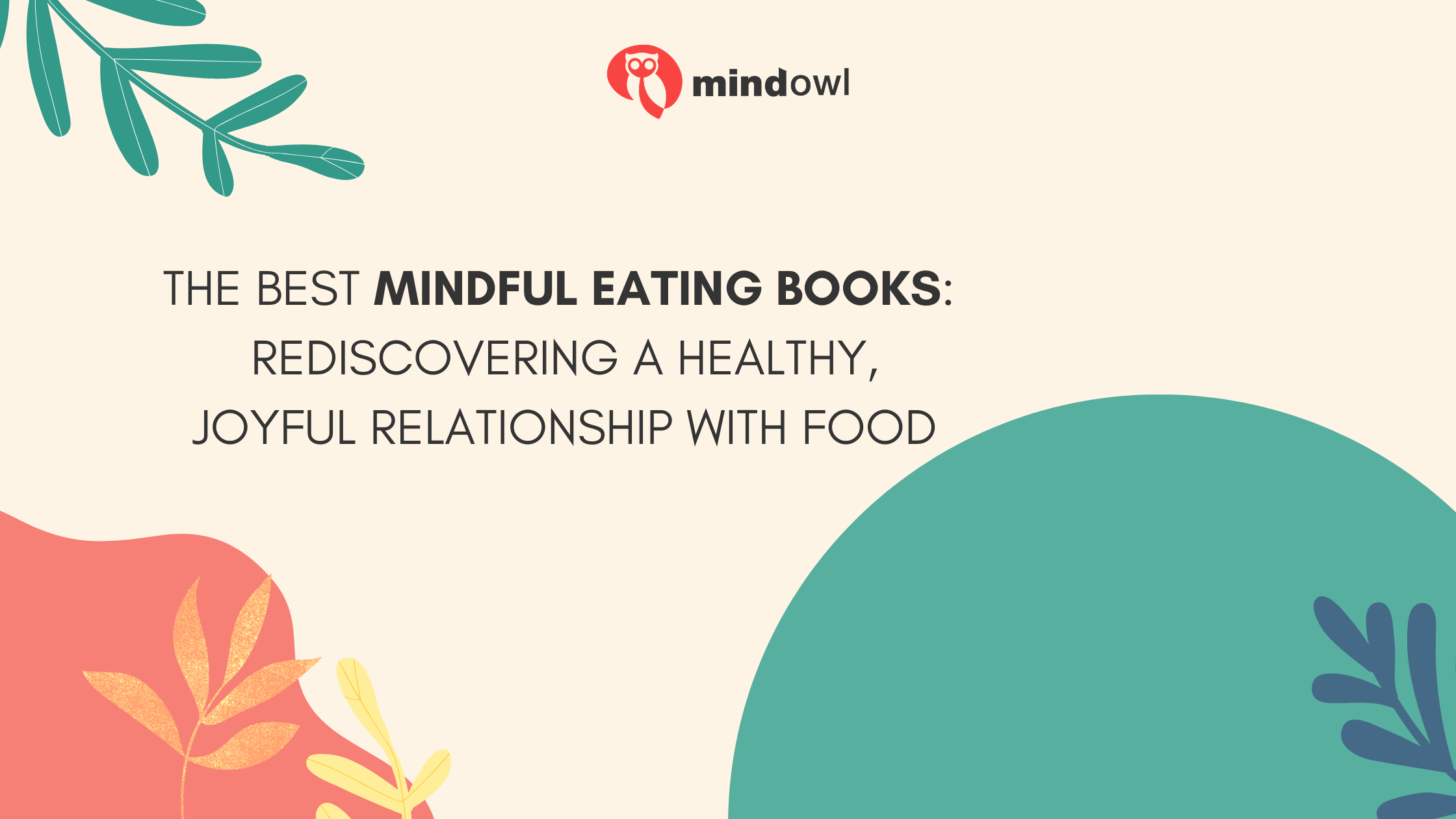Many people struggle with their eating habits and how they view food. But, there’s a brighter way to look at our meals—a path that leads to enjoying what we eat without stress or shame.
It’s called mindful eating, a practice that transforms our battles with food into peaceful and satisfying experiences.
One interesting fact is that this approach isn’t about strict diets or quick fixes. Instead, it nurtures a friendly relationship between us and our meals. Through this blog post, we’ll explore books written by experts who will guide you through rekindling love for your daily bread in healthy ways.
Key Takeaways
- Mindful eating teaches us to enjoy every aspect of our meals, paying close attention to smells, tastes, and textures.
- Books on mindful eating offer practical advice on breaking free from guilt and stress around food by focusing on meditation and mindfulness practices.
- Various authors bring unique perspectives, sharing techniques for managing cravings, finding joy in cooking and eating, and improving both physical and mental health through more aware meal choices.
Understanding Mindful Eating
Mindful eating turns food from an enemy into a friend. This approach teaches us to pay full attention while we eat. We notice the colors, smells, textures, and flavors of our food.
We also listen to how our bodies feel about hunger and fullness. This way of eating helps us enjoy every bite without guilt or anxiety.
This method challenges diet cultures that focus on restrictions. It embraces a balanced relationship with food instead. Mindful eating encourages us to be kind to ourselves and make choices that nourish both body and soul.
Through this practice, feelings like joy and satisfaction become part of our meals again.
‘Mindful Eating: A Guide to Rediscovering a Healthy and Joyful Relationship with Food’ by Jan Chozen Bays, MD
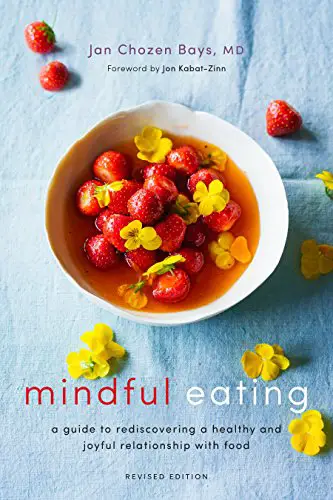
“Mindful Eating: A Guide to Rediscovering a Healthy and Joyful Relationship with Food” teaches us how mindfulness can transform our battles with food into peace. The book shares tips on using meditation to form a better bond with our bodies and how saying thanks to food and those around us enriches this relationship.
This guide helps readers see food as a friend, not an enemy, through mindful practices.
Mindfulness turns eating into a joyful journey rather than a battle.
We learn how full attention during meals makes every bite matter. It’s about more than just what’s on our plates; it’s the feelings and thoughts that come up while we eat. The book is packed with simple yet powerful exercises to foster this wholesome connection.
Jan Chozen Bays opens the door for everyone aiming for satisfaction in their meals without the guilt or struggle usually linked to eating.
‘Eating Mindfully: How to End Mindless Eating & Enjoy a Balanced Relationship with Food’ by Susan Albers, Psy. d
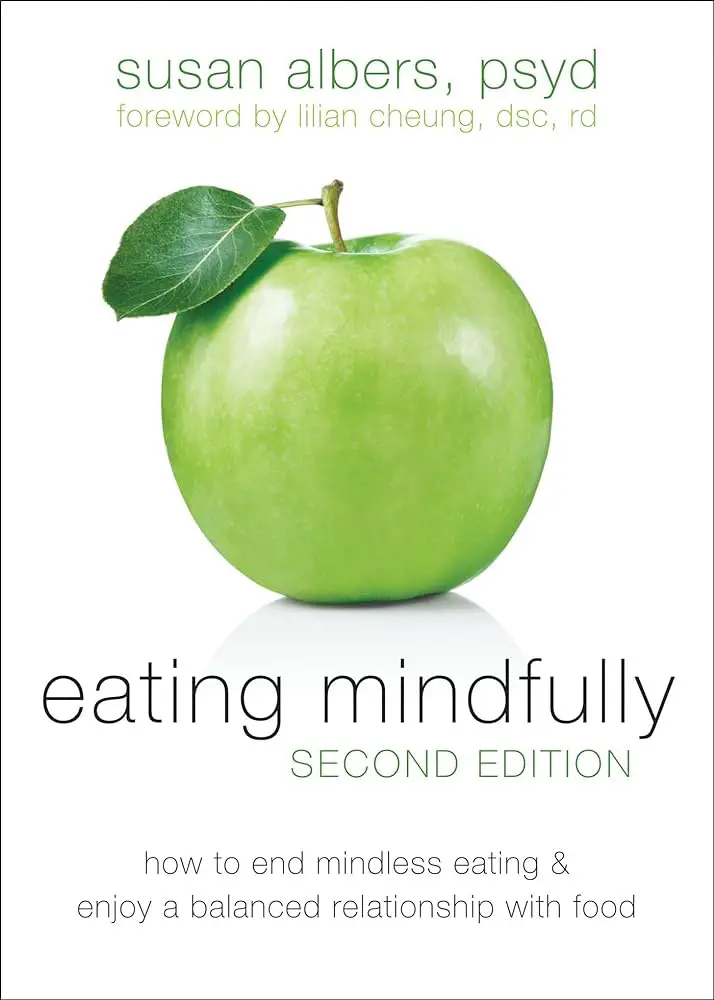
Eating mindfully teaches us to pay full attention to our food. Jan Chozen Bays’ book guides readers through this process with practical tools. These methods are easy to use and based on solid science.
The key is learning how to observe and manage our eating habits more closely.
The book helps people build a healthier relationship with food. By applying mindfulness and acceptance, one can enjoy eating without guilt or stress. It offers strategies to stop eating without thinking and start enjoying meals more peacefully.
Through its tips, you can learn to understand your cravings better and how not to give in to them mindlessly.
‘Eat to Love: A Mindful Guide to Transforming Your Relationship with Food, Body, and Life’ by Jenna Hollenstein, RD
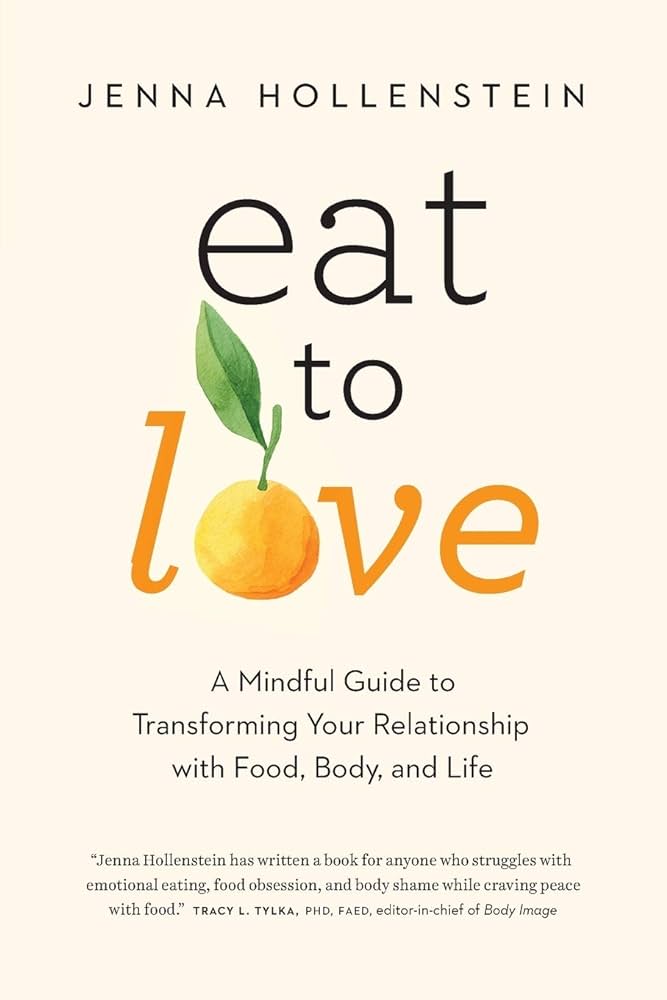
“Eat to Love” breaks the mould of traditional dieting books by offering a joyful path to understanding our bodies and food. Written by Jenna Hollenstein, a nutrition therapist, this book takes readers on a journey away from diet culture.
It dives into mindful eating and intuitive dining practices. These methods help us create a loving connection with food and our bodies. The advice steers clear of restrictions that make eating feel like a chore.
“This book invites you to fall in love with yourself, your body, and your life.”
The key is freedom from fat stigma and learning to eat with joy instead of guilt or fear. “Eat to Love” uses real stories and practical tips to show how anyone can transform their approach to food.
Hollenstein’s techniques are not just about what we eat but how we think about ourselves while eating.
‘Savor Every Bite: Mindful Ways to Eat, Love Your Body, & Live with Joy’ by Lynn Rossy, PhD
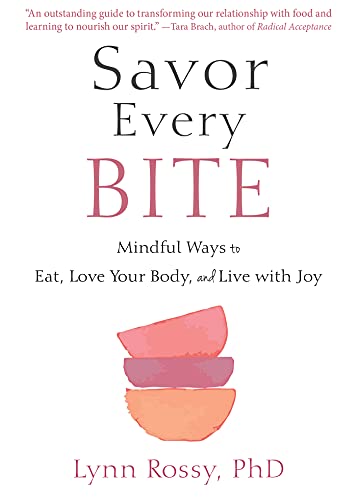
Lynn Rossy, PhD, teaches us in “Savor Every Bite” how to build a happier life by changing the way we eat. The book mixes mindfulness with eating and shows us how this can turn our view of food around.
It offers simple breathing exercises and other methods that help not just with food but in our daily lives too. This guide also supports the Health at Every Size movement, stressing that everyone can have a healthier relationship with food without worrying about their size.
The author promises that by taking time to really taste every mouthful, we won’t eat as much but will enjoy our food more. Rossy explores ways to face hard emotions and find better coping strategies without turning to food for comfort.
She believes cooking and eating should bring joy, transforming meals into moments of real pleasure rather than sources of anxiety or guilt. Through mindful practices – from picking ingredients to enjoying the last bite – readers learn how satisfaction with eating enriches overall well-being.
‘The Mindful Eating Workbook’ by Vincci Tsui, RD
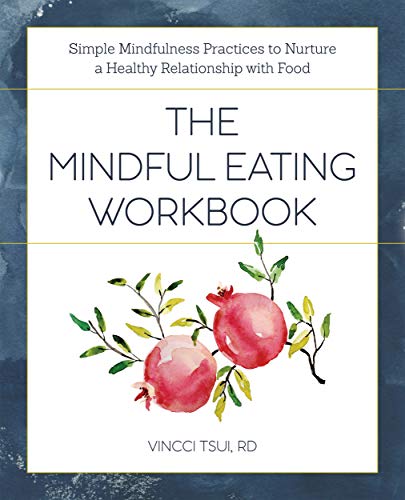
The Mindful Eating Workbook, crafted by Vincci Tsui, serves as a beacon for those eager to forge a new relationship with food. This workbook breaks down mindful eating into digestible chunks.
It starts with the basics, guiding readers through the core ideas and beliefs that make up this thoughtful approach to nutrition. Tsui uses reflective exercises and strategies effectively, making it easier for individuals to understand their food habits.
This guide is more than just theory; it shines in its practicality. Readers find real techniques they can use during meal times to ensure they’re truly present and enjoying every bite.
The focus is on rekindling a joyful connection with eating using mindfulness-based strategies that stick. For anyone looking to turn their meals from routine to remarkable while nurturing a healthier view of food – this workbook opens the door wide open.
The Impact of Mindful Eating on Health
Studies show that the mindful eating approach leads to a healthier relationship with food. People begin to notice what makes their bodies feel good and what doesn’t, moving away from mindless munching towards more thoughtful choices.
This method has proven impacts on health such as decreasing overeating and aiding those struggling with undereating disorders like anorexia. Mindful eating encourages us to appreciate meals more and can lead to better digestion as our bodies respond positively to being in a relaxed state while dining.
Embracing these techniques not only improves physical well-being but also enhances mental health by reducing stress around meal times, making each dining experience enjoyable and satisfying without the guilt often associated with eating.
Conclusion
Mindful eating books offer practical guidance for developing a healthy and joyful relationship with food. Through the use of meditation and mindfulness practices, these books aim to transform struggles with food into a more compassionate approach to eating.
By providing actionable steps and tools, they emphasise the importance of fostering a mindful and joyful connection with food while promoting overall well-being. With their revised editions and audio formats, these best-selling books continue to have ongoing relevance and popularity in today’s digital world.
FAQs
1. What is mindful eating, and how can it change my relationship with food?
Mindful eating is an approach that involves bringing your full attention to the process of eating—to all the tastes, smells, thoughts, and feelings that arise during a meal. This thoughtful approach to eating and drinking can positively transform your relationship with food, turning it from foe to friend.
2. Can reading books on mindful eating really help me stop binge eating?
Yes! The best mindful eating books offer practical tips for eating mindfully and provide guidance on overcoming emotional and binge-eating habits through mindfulness practices—from a beloved Zen perspective. They teach you how to end mindless eating and enjoy a balanced diet.
3. Are there any great book recommendations for beginners interested in intuitive eating?
Absolutely! Books like those written by Jan Bays or works focusing on the intuitive eating workbook are perfect for starters. These resources guide developing healthy eating habits through mindfulness practices—offering readers a guide to lifelong health without resorting to traditional diet books.
MindOwl Founder – My own struggles in life have led me to this path of understanding the human condition. I graduated with a bachelor’s degree in philosophy before completing a master’s degree in psychology at Regent’s University London. I then completed a postgraduate diploma in philosophical counselling before being trained in ACT (Acceptance and commitment therapy).
I’ve spent the last eight years studying the encounter of meditative practices with modern psychology.

